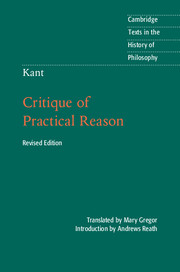Book contents
- Frontmatter
- Contents
- Introduction
- Chronology
- Further reading
- Note on the translation
- Critique of Practical Reason
- Preface
- Introduction On the idea of a critique of practical reason
- The critique of practical reason Part one Doctrine of the elements of pure practical reason
- The critique of practical reason Part two Doctrine of the method of pure practical reason
- Doctrine of the method of pure practical reason
- Conclusion
- Index
Doctrine of the method of pure practical reason
Published online by Cambridge University Press: 05 February 2015
- Frontmatter
- Contents
- Introduction
- Chronology
- Further reading
- Note on the translation
- Critique of Practical Reason
- Preface
- Introduction On the idea of a critique of practical reason
- The critique of practical reason Part one Doctrine of the elements of pure practical reason
- The critique of practical reason Part two Doctrine of the method of pure practical reason
- Doctrine of the method of pure practical reason
- Conclusion
- Index
Summary
The doctrine of the method of pure practical reason cannot be understood as the 5:151way to proceed (in reflection as well as in exposition) with pure practical principles with a view to scientific cognition of them, which alone is properly called method elsewhere, in the theoretical (for popular cognition needs a manner but science a method, i.e., a procedure in accordance with principles of reason by which alone the manifold of a cognition can become a system). Here the doctrine of method is understood, instead, as the way in which one can provide the laws of pure practical reason with access to the human mind and influence on its maxims, that is, the way in which one can make objectively practical reason subjectively practical as well.
It is now clear that those determining grounds of the will which alone make maxims properly moral and give them a moral worth – the immediate representation of the law and the objectively necessary observance of it as duty – must be represented as the proper incentives to action, since otherwise legality of actions would be produced but not morality of dispositions. But it is not so clear, and on the contrary must at first glance seem to everyone quite improbable, that even subjectively that presentation of pure virtue can have more power over the human mind and can provide a far stronger incentive to effect even that legality of actions and to bring forth stronger resolutions to prefer the law to every other consideration, from pure respect for it, than all the deceptive allurement of enjoyment and, in general, everything that may be counted as happiness, or even all threats of pain and troubles can produce.
- Type
- Chapter
- Information
- Kant: Critique of Practical Reason , pp. 121 - 129Publisher: Cambridge University PressPrint publication year: 2015

